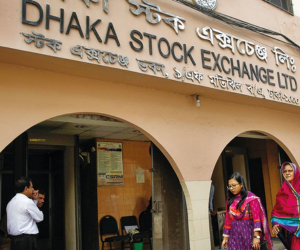Looking to invest in the capital market in Bangladesh but not sure where to begin? This article introduces you to this broker, how they operate under BSEC regulations, and what services they offer to help you invest.
We explain how to open your BO account, what products you can trade, and what to keep in mind if you're new to investing. A clear and useful guide for accessing the Dhaka and Chittagong Stock Exchanges with confidence.

Trading with NRBC Bank: Bank-Based Brokerage with Nationwide Reach
NRBC Bank extends its services to the stock market through a brokerage wing designed for both new and experienced investors. With strong coverage across the country, it offers access to the DSE with solid infrastructure and support.
You can trade shares, government securities, mutual funds, and apply for IPOs. Their online portal includes basic analytics, trade history, and portfolio summaries.
To start trading, bring your national ID, photo, proof of address, and bank information to a branch or register online.
NRBC Bank is a great fit for those who want to keep their banking and investing in one place — with local access and nationwide reliability.
What Are Stockbrokers and How Do They Work in Bangladesh?
Stockbrokers are licensed financial intermediaries who facilitate the buying and selling of securities on behalf of investors. They operate through the country’s two major exchanges — the Dhaka Stock Exchange (DSE) and the Chittagong Stock Exchange (CSE) — and are regulated by the Bangladesh Securities and Exchange Commission (BSEC).
Stockbrokers play a vital role in enabling retail and institutional investors to access the capital markets. From executing trades to offering market insights and portfolio services, they ensure investors can participate in a regulated and orderly investment environment. Here's how brokers work in the Bangladeshi market:
Trading Services: Stockbrokers execute buy and sell orders for shares, mutual funds, corporate bonds, and other securities listed on the DSE and CSE. Orders may be placed in person, over the phone, or via online trading platforms.
Licensing and Regulation: All brokers must be registered with the BSEC and operate under the Securities and Exchange Rules of Bangladesh. This includes compliance with investor protection standards, disclosure norms, and reporting requirements.
BO Account Opening: To invest through a broker, clients must open a Beneficiary Owner (BO) Account with the Central Depository Bangladesh Limited (CDBL). The broker usually facilitates this process on behalf of the client.
Research and Advisory: Some brokers provide market research, technical analysis, and investment advice to clients. This is particularly useful for retail investors looking for long-term portfolio growth or regular dividend income.
IPO Applications: Stockbrokers assist clients in applying for Initial Public Offerings (IPOs) through both electronic and manual methods. This is a popular entry point for many new investors in Bangladesh.
Clearing and Settlement: Trades are settled through the CDBL, which holds securities in electronic form and ensures proper transfer of ownership. Settlement usually takes place on a T+2 basis.
Clients Served: Brokers in Bangladesh cater to individual investors, small businesses, NRBs (Non-Resident Bangladeshis), corporate entities, and institutional investors such as insurance companies and mutual funds.
Fees and Commissions: Brokerage charges are subject to regulatory limits set by the BSEC and may vary depending on the broker and the type of service provided.
Tradable Instruments on the Dhaka Stock Exchange
DSE is the largest and most active capital market in Bangladesh. It plays a central role in the country’s financial development by providing a transparent and regulated platform for raising capital and investing in listed securities. Both local and foreign investors can participate in the market through a range of tradable instruments.
Supervised by the Bangladesh Securities and Exchange Commission (BSEC), the DSE operates under the Securities and Exchange Ordinance of 1969 and other relevant legislation. The instruments listed below represent the key products currently available for trading on the DSE:
Equities (Shares): Ordinary shares of publicly listed companies are the most actively traded instruments on the DSE. These represent partial ownership in companies across sectors such as banking, cement, textiles, power, pharmaceuticals, telecommunications, and more. Shareholders may receive dividends and benefit from price appreciation over time.
Mutual Funds (Closed-End and Open-End): Listed mutual funds allow investors to gain access to professionally managed portfolios that invest in equities, bonds, or a mix of both. Closed-end funds are traded on the exchange like shares, while open-end funds are redeemed through asset management companies. These are popular among retail investors for diversification and simplicity.
Corporate Bonds and Debentures: Although limited in number, some corporate bonds and debentures are listed on the DSE. These debt instruments offer fixed returns and are suitable for investors seeking steady income with lower risk than equities. More development in this segment is expected as the bond market matures.
Government Securities (via Auction): While not directly traded on the DSE, Treasury Bills and Bangladesh Government Bonds (BGTB) are accessible to institutional and retail investors through the Bangladesh Bank’s auction system and secondary market brokers. These are considered low-risk investment options.
Preference Shares: Some companies list preference shares, which offer fixed dividend payments and may carry certain redemption rights. These instruments are attractive to investors seeking more stable income with priority over ordinary shareholders in dividend distribution.
Rights Shares: When listed companies raise capital, they may offer rights shares to existing shareholders at a discounted price. These instruments are tradable for a limited period and can provide attractive entry points for investors who want to increase their holdings.
Initial Public Offerings (IPOs): IPOs allow companies to list for the first time on the DSE and raise funds from the public. Retail and institutional investors may apply for IPOs via the electronic subscription system (ESS), and successful applicants receive allotments before the stock is listed for trading.
Exchange-Traded Funds (Planned): While ETFs are not yet actively listed, the regulatory framework is being developed by BSEC to introduce these products in the near future. ETFs are expected to broaden investment opportunities and improve market depth once launched.





